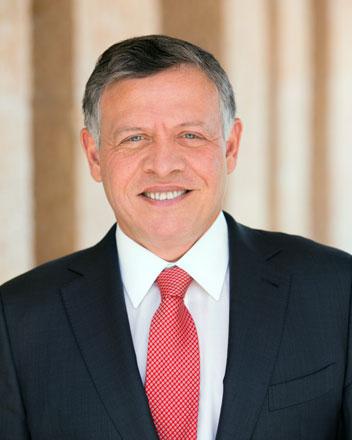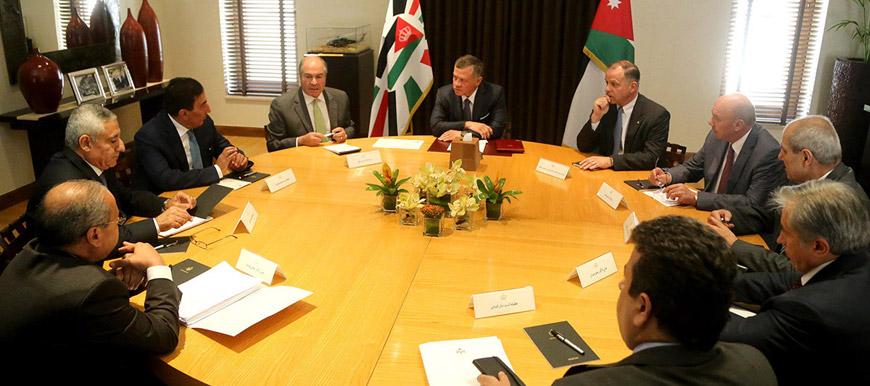You are here
King urges strict, swift implementation of judicial reform plan
By JT - Feb 26,2017 - Last updated at Feb 26,2017

His Majesty King Abdullah meets with a panel tasked with drawing up a strategy to reform the judicial system in Amman on Sunday (Photo courtesy of Royal Court)
AMMAN — His Majesty King Abdullah on Sunday said that the judiciary is a red line, vowing to personally follow up on the recommendations of a panel tasked to improve the judicial environment in the Kingdom.
He made the remarks as he received the report compiled by the Royal Committee for Developing the Judiciary and Enhancing the Rule of Law, which came up with 49 suggestions, some of which have been key demands by advocacy groups and activists for decades.
The implementation of the plan will involve changes to, or the introduction of 16 pieces of legislation.
The Royal committee was formed in October 2016 under the chairmanship of former prime minister Zeid Rifai. Its mandate was to draw up a comprehensive strategy within four months to address the challenges facing the judicial reform process and improve legislation.
During the meeting with the committee’s president and members at Al Husseiniya Palace, also attended by HRH Prince Feisal, the King hailed the recommendations. He said that they had the potential to enroot effective and just judicial procedures as a key pillar of a state of justice and law that safeguards the rights and freedoms of its citizens.
The implementation stage should begin immediately, the King said, urging coordination among the three branches of government to translate the plan into concrete measures and policies within the current year.
His Majesty underlined the potential impact of success in this endeavour, especially since it would assure citizens and investors that their rights are protected and transactions completed within reasonable timeframes.
For his part, Rifai said the 14-member committee had held intensified meetings, reviewed the opinions of the concerned parties, and consulted leading jurists and the best international practices in the field.
The taskforce also reviewed the achievements of previous committees with a similar mandate and the work of the Judicial Council and the Ministry of Justice, covering all the aspects of the mission, with focus on human rights, criminal and civil laws, tribunal formation, the Judicial Council, public prosecution, judicial inspection, judges’ affairs and judicial environment.
Rifai stressed that the judicial system cannot be reformed without ensuring the independence of the judiciary.
This includes ensuring optimal independence of the Judicial Council to appoint, transfer, promote and mandate judges as well as serve their interests and ensure them job security.
Regarding criminal justice, Rifai said, his team worked not only to update related procedures to ensure fair trials, but moved on to suggest changes to the criminal policy as a whole to achieve full abidance by the rule of law.
The experts also revisited the procedures of litigation to stand on the reasons behind the delay in the process and suggested solutions.
Rifai said the recommendations touched on the way the legal system is managed and suggested rehabilitating human resources, building a judicial system that is based on specialisation and improving infrastructure of courts.
Recommendations included benefiting from modern technology in all judicial measures, such as filing lawsuits, exchanging memos and the necessary documents and applications between the court, police, forensic experts and other supporting bodies.
As for enhancing the environment of business and investment, the Royal committee’s report suggested establishing a special court room to look into trade cases of economic significance, including cases involving construction contracting, banking, monopoly, insurance, securities and maritime cases.
To ensure proper law enforcement, the committee recommended stiffening penalties on some crimes, including festive firing, car theft, assaults on public servants and writing bad cheques or falsifying documents like medical reports.
They also include harsher penalties on crimes against people with disabilities.
The meeting was attended by Royal Court Chief Fayez Tarawneh and King’s Office Director Jafar Hassan.
Related Articles
AMMAN — His Majesty King Abdullah on Tuesday entrusted former prime minister Zeid Rifai with chairing a committee to reform the judiciary an
AMMAN — His Majesty King Abdullah on Sunday stressed the importance of implementing the recommendations of the Royal Committee for Developin
AMMAN — Jordan Judicial Institute Director General Thaer Odwan on Wednesday presented a report on the institute’s role in responding to the

















